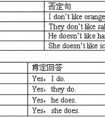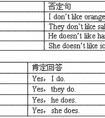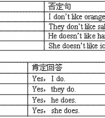句型转换。1. We are going to skip. (同义句)__________________________________________________________2. I drive a car to school every day. (同义句) _________-六年级英语
之后、关于、在......方面,有关介词须记全。
in内to外表位置,山、水、国界to在前。
考点名称:实义动词
实义动词:
与系动词是相对的,系动词亦称连系动词,作为系动词,它本身有词义,但不能单独用作谓语,后边必须跟表语(亦称补语),构成系表结构说明主语的状况、性质、特征等情况。
实义动词意思完全,能独立用作谓语。
实义动词有及物动词和不及物动词(及物动词是指后面要求有直接宾语的动词;
不及物动词指后面不需要跟宾语的动词)即行为动词,表示动作的动词。
实义动词(又称行为动词):表示行为或状态,有完全的词义,能独立作谓语。
如:I go to school by bus. 我乘公交车去上学。
The students clean their classroom every day. 学生每天打扫教室。- 及物动词:
后面必须跟宾语,意义才完整的实义动词,叫做及物动词(transitive verb)。
英语中的及物动词有:interest,worry,guss,please,surprise,love等
例如:I believe that the committee will consider our suggestion.我相信委员会将会考虑我们的建议。
“How long can I keep the book ”Harry asked.哈里问:“这本书我可以借多久?”
Dr. Bethune set us a good example. 白求恩大夫给我们树立了好榜样。
Crude oil contains many useful substances.原油含有许多有用的物质。
不及物动词:
本身意义完整,后面不用跟宾语的实义动词,叫做不及物动词(intransitive verb)。
Birds fly.鸟会飞。
It happened in June 1932.这件事发生于一九三二年六月。
My watch stopped.我的表停了。
She spoke at the meeting yesterday evening. 她在昨天晚上的会上发了言。
兼作及物动词和不及物动词:
英语里有不少实义动词可以兼作及物动词和不及物动词。
这样的动词又有两种不同的情况:
a)兼作及物动词和不及物动词时,意义不变。试比较:
Shall I begin at once?我可以立刻开始吗?(begin作不及物动词)
She began working as a librarian after she left school.她毕业后当图书馆管理员。(began作及物动词)
When did they leave Chicago?他们是什么时候离开芝加哥的?(leave 作及物动词)
They left last week. 他们是上周离开的。(left 作不及物动词)
b)兼作及物动词和不及物动词时,有时意义不尽相同。如:
Wash your hands before meals.饭前要洗手。
Does this cloth wash well? 这布经得起洗吗?
与汉语的比较:
有时英语动词的及物和不及物的用法,与汉语的用法完全不一样,请注意下列两种情况:
a)有的动词在英语里只能用作不及物动词,而汉语则可用作及物动词,如arrive到达,agree同意,listen听。英语里这些动词后面常接介词。如:
We arrived at the railway station at noon.我们于中午到达火车站。(at不能省去)(比较:We reached the railway station at noon.)
Everybody listened to the lecture with great interest.每个人都很有兴趣地听讲课。(to不可省去)(比较:We all heard the lecture.)
Do they agree to the plan?他们同意这个计划吗?(to不可以省去)
b)有的动词在英语里能用作及物动词,而在汉语里则不能用作及物动词,如serve为…服务。
Our children are taught to serve the people wholeheartedly.我们的儿童被教以全心全意为人民服务 - 特殊实义动词:
英语动词很多既是及物动词又是不及物动词,如
close, begin, study, leave, work等。
①The post office closes at 9:00 p. m.邮局晚上9点关门。
②Close the window,please.请关窗。
③Shall we begin now?我们现在开始吗?
④ Bill began working as a sailor after he left school.比尔毕业后当水手。
⑤They left yesterday.他们昨天离开的。
⑥When did you leave Washington?你什么时候离开华盛顿的?
⑦The students study hard.这些学生学习努力。
⑧The students study English and German.这些学生学习英语和德语。
⑨He works in a supermarket.他在一家超市工作。
⑩He works the machine on Mondays.他星期一操作这台机器。
考点名称:否定句
- 否定句:
表示否定的句子。必须有否定词。
否定句的构成形式:
a. 谓语为be动词时,“be+not "一名学生。
b. 谓语为实义动词而且没有情态动词和助动词时,“do/ does/ did+not"构成否定。
例:I do not like dancing. 我不喜欢跳舞。
He does not want to go to school. 他不想去上学。
c. 谓语为“情态动词+实义动词”时,“情态动词+not”构成否定。
例:You must not smoke. 你千万不要吸烟。
I can not catch it. 我抓不住它。 - 否定句在英语语法中可以分为九类:
(1)一般否定句
I don't know this. No news is good news.
There is no person(smoking)/not a person/not any person(smoking)in the house.
(2)特指否定
He went to his office, not to see him.
I am sorry for not coming on time.
I don't think/believe/suppose/feel/imagine you are right.
(3)部分否定
All the answers are not right
All is not gold that glitters
I don't know all of them.
I can't see everybody/everything.
Both of them are not right.
(4)全体否定
None of my friends smoke.
I can see nothing/nobody.
Neither of them is right.
Nothing can be so simple as this.
(5)延续否定
You didn't see him, neither/nor did I.
You don't know, I don't know either.
He doesn't know English, let alone/to say nothing of/not to speak of(更不用说)French.
(6)半否定句
We seldom/hardly/scarcely/barely hear such fine singing.
I know little English. I saw few people.
(7)双重否定
You can't make something out of nothing.
What's done cannot be undone.
There is no sweet without sweat.
No gain without pains.
I can't help /keep/ laughing whenever I hear it.
No man is so old but(that)he can learn.
(8)排除否定
Everyone is ready except you.
He did nothing but play.
But for your help, I couldn't do it.
(9)加强否定
I won't do it at all.
I can't see it any more.
He is no longer a boy. 否定转移的形式与用法:
一、动词的否定转移
1.形式上否定主句的谓语,实际上是否定从句的谓语
当动词“think”、“believe”、“suppose”、“imagine”、“expect”、“feel”的主语是第一人称,谓语动词为没有任何副词修饰的一般现在时,它们的否定式实际上是对宾语从句的否定。
表示说话者提出一种委婉的看法或主张。如:
I think that he will help us.——I don’t think that he will help us. 我认为它不会帮助我们。
I believe that he is right.——I don’t believe that he is right. 我认为他不对。
I suppose that he likes it.——I don’t suppose that he likes it. 我想他不喜欢它。
2. 形式上否定谓语动词,实际上否定复合宾语
当动词“think”、“believe”、“suppose”、“imagine”、“expect”、“feel”、“find”的主语是第一人称,谓语动词为没有任何副词修饰的一般现在时,它们前面的否定式实际上是对复合宾语的否定。表示说话者所提出的一种委婉的看法或主张。如:
I think math difficult. — I don’t think math difficult. 我认为数学不难。
I find the story interesting. — I don’t find the story interesting. 我认为这个故事没有趣。
I expect so. —I don’t expect so. 我认为不会。
二、动词“think”、“believe”、“suppose”、“imagine”、“expect”、“feel”在下列情况下,否定不转移:
1.这些动词跟其他另一个动词一起做并列谓语时,否定不转移。如:
I believe and hope he won’t do that. 我相信并且也希望他将不会那样做。
I feel and admit that we are not foolish. 我觉得并且也承认我们并不愚蠢。
2.用于疑问句时,否定不转移。如:
Do you think it is not going to rain? 你认为天不会下雨吗?
Don’t you believe that he has done a good thing? 难道你不相信他做了一件好事?
3.用作插入语时,否定不转移。如:
Li Lei, I think, won’t be angry with you. 我想李蕾不会生你的气。
Tom, I suppose, won’t be against it. 我猜想汤姆不会反对。
Mike, I believe, hasn’t seen the film. 我认为迈克没有看这场电影。
4.动词前有其他副词修饰时,否定不转移。如:
- 最新内容
- 相关内容
- 网友推荐
- 图文推荐
| [家长教育] 孩子为什么会和父母感情疏离? (2019-07-14) |
| [教师分享] 给远方姐姐的一封信 (2018-11-07) |
| [教师分享] 伸缩门 (2018-11-07) |
| [教师分享] 回家乡 (2018-11-07) |
| [教师分享] 是风味也是人间 (2018-11-07) |
| [教师分享] 一句格言的启示 (2018-11-07) |
| [教师分享] 无规矩不成方圆 (2018-11-07) |
| [教师分享] 第十届全国教育名家论坛有感(二) (2018-11-07) |
| [教师分享] 贪玩的小狗 (2018-11-07) |
| [教师分享] 未命名文章 (2018-11-07) |





![Sue ____________ agoodmovienextweek.[ ]A.seesB.sawC.willsee-六年级英语](http://www.00-edu.com/d/file/ks/4/1/53/2019-08-24/small05342db0dbc0986b364ddef33f8616821566592176.jpg)
